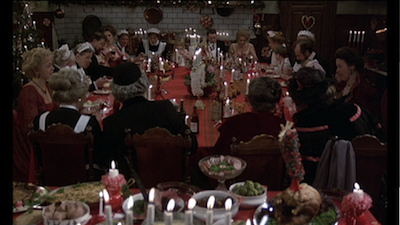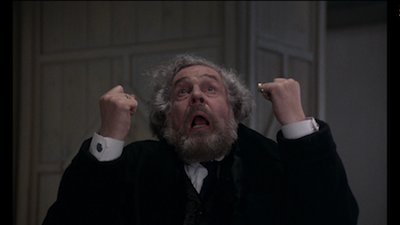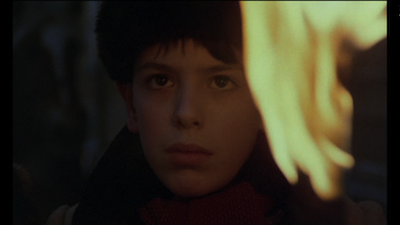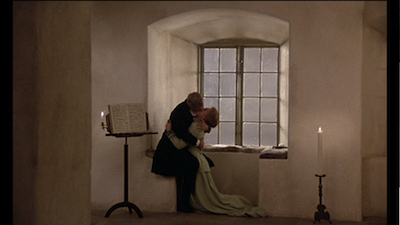
I wish there was a way to get my family to agree to making Fanny and Alexander our official selection for annual holiday viewing. Hell, I suppose I'd just be happy if we had something to watch together on either Thanksgiving or Christmas so we wouldn't end up haggling over which flick to take in together. This most recent post-Thanksgiving Black Friday was black for me because I ended up in a theater watching Adam Sandler's execrable Jack and Jill rather than, say, sitting at home with It's a Wonderful Life [review]. Ingmar Bergman's 1982 swan song Fanny and Alexander, depending on what cut we chose, would equal a bare minimum of three hours of focused time, a respite from awkward conversation and thumb twiddling. And let's get real, Bergman delivers an epic fart joke in the first part of the film that decimates any gastric gag Sandler will ever come up with. You feel me?
Actually, that fart joke is a good segue. Most people wouldn't think bodily humor exists anywhere in Bergman's oeuvre, but the Swedish director wasn't nearly so uptight as all that. Uncle Carl (Börje Ahlstedt) blowing out the candles with his butt is a guaranteed, honest laugh, and given the fact that Fanny and Alexander is semi-autobiographical in nature, it probably works because it's so authentic. The family experience here is delightfully real. There are squabbles and differences, rivalries and frustrations, and an underlying togetherness, with each separate alliance connecting one Uncle to an Aunt through another Aunt and vice versa without the opposite sides ever having to be cognizant of the union.

Fanny and Alexander opens on Christmas Eve in 1907. The prominent Ekdahl family is gathering for their annual feast, hosted by their eldest matriarch Helena (Gunn Wållgren). Helena's children come from all walks of life. Her son Gustav Adolf (Jarl Kulle) runs a restaurant. Another son, Oscar (Allan Edwall), runs a theater. Just before dinner, he and his troupe, which includes his beautiful wife and lead actress Emilie (Ewa Fröling), perform a religious pageant for a welcoming audience. Oscar and Emilie are also father and mother to Fanny and Alexander (Pernilla Allwin and Bertil Guve), a young daughter and her older brother. Alexander is an imaginative boy. At the start of the film, he thinks he sees a statue move. Later, he sees ghosts. His genetic penchant for storytelling could end up being his downfall.

Fanny and Alexander was originally produced for Swedish television, where it was shown in four parts, totaling over five hours. An alternate theatrical version was cut down to three hours but bears the same basic four-part structure. In essence, the story flows from that extended Christmas celebration and back into common life, where in the second part Oscar passes away and Emilie remarries. Her new husband is the Bishop who oversaw Oscar's funeral, and he becomes Uncle Edvard (Jan Malmsjö). The third part chronicles the cruel and often surreal life in the Bishop's home, while the fourth shows the escape of first the children and then Emilie. Within this are several subplots, charting the family drama, including Carl's trouble with money and Gustav Adolf's affair with the pretty maid Maj (Pernilla Walgren). Both are important for how the wives react to each predicament, and also the judgments of Mother Helena. For all the male bluster, the Ekdahls are a clan where women rule the household. This is the irony of Emilie's bad marriage: she goes to Edvard looking for stability, but his strict views don't jibe with how she has raised her kids. It's further ironic that Edvard lives with his mother, sister, and aunt, as well as three housekeepers of disparate ages. In truth, he is subject to their care, and he controls nothing.

The children's arc in the film is not so much a coming-of-age tale as it is a vision of how the young contend with the duality of earthly concerns and spiritual matters. Both siblings, and Alexander in particular, are regularly made aware of the split between the here and now and of that which can't be quantified. Hence, when their father is struck down while practicing to play the ghostly dad in Hamlet, it only makes sense that Oscar should become a ghost for real--one that only the very young and the very old can see (as Helena comments, the in between of average adulthood disappears within the course of a normal life). This thin veil very much allows for a mingling of the sacred and the profane, as best illustrated by Alexander swearing under his breath at his father's burial. These earthy words keep him and Fanny grounded.

Considering this, then, we see that Edvard's greatest sin is not his meanness, but his indulging in common desire (his tacky courtship of a grieving widow) and his forgetting that love is not a celestial practice, but instead something that must be extended to the living. This is what separates him from the other holy man, the Jewish friend of the family Isak Jacobi (Bergman regular Erland Josephson). Isak embraces the Ekdahls as if they were his own flesh and blood, and he would seem to be in possession of real magic (as seen in one of Fanny and Alexander's most powerful scenes). Both performers display these traits in their acting: Malmsjö is cold, stiff, and full of starch; Josephson is warm and inviting. Isak's specialness is seen further at his home, which also includes his nephew's puppet shop, connecting the Jacobies further to Alexander, who loves puppets and performance. The division between "good" and "evil" can also be seen in the dual house guests--Edvard's invalid aunt and Isak's mysterious other nephew, Ismael (Stina Ekblad). In a surprising trick, Bergman casts the opposite gender to play each part, challenging the audience's perception and how they react to each at the same time he challenges Alexander. Which one is angel and which one devil?

Then again, as they say, the devil is in the details, and Fanny and Alexander is packed stem to stern with them. This is a lavish production, impressive in its staging and its scope. Art direction, sets, and costumes all capture the opulence of the Ekdahl family and the gorgeous detailing of turn-of-the-century fashions. By contrast, Edvard's estate is more like a fortress than a home. It is barren and lacking in material decoration. Cinematographer Sven Nykvist brilliantly captures the sullen grays of this stony palace. It is brutal and oppressive and lit as if it were locked in an eternal winter, whereas the Ekdahl homes are bright and summery, full of color and movement.

When Criterion first released Fanny and Alexander seven years ago, it was as a large boxed set, spreading the two versions of the film across three discs and rounding it out with a fourth, the documentary The Making of Fanny and Alexander*. The 110-minute film was put together by Bergman himself in 1983, using footage shot by Arne Carlsson. It is essentially the prototype most good DVD supplements have followed, showing the maestro at work on his set, laboring over scenes until he gets them right. It can be a bit dry, honestly, but it also provides an essential portrait of the master filmmaker's passion for good storytelling. Come to think of it, the inclusion of the aforementioned fart joke makes even more sense when you see Bergman trying to instruct his young stars and keep things light so that they want to listen to and trust him.


In terms of the two different cuts of the main feature, choosing one or the other is I guess a matter of preference, though I think more importantly it's a matter of what you have time for. The television version is nearly twice the length of the theatrical version, and I think it's empirically the better piece of cinema, but the shorter cut of Fanny and Alexander is the rare case where a complicated narrative can be compressed without being reductionist. The differences in terms of what we see is vast, but the final products are still oddly similar. What the longer cut brings to the table, besides additional scenes (the entire Christmas celebration is monumental and immersive) is greater character motivation and room to explore the relationships of the many characters, as well as more fantasy elements that add to the breadth of Bergman's metaphysical mysteries and his spiritual ponderings. I also think that Fanny is allowed to be more of a character in the longer cut: if Alexander is a sponge for all that goes on around him, Fanny is even moreso, but she exhibits more strength in her added scenes. Both child actors show a great depth, even when just silently watching the action. You always have a sense that they are actively observing, as opposed to just passively standing by.
Anyway, in short, if you're going to watch one version of Fanny and Alexander, I vote for the television broadcast; if you want to watch both, you can really start with either. The difference would be whether you want to get your feet wet and then wade deeper in, or if you'd rather get it all at once and then relive the experience in summary.

* There was also a fifth disc featuring introductions for eleven older Bergman movies that he recorded for a retrospective on Swedish television. Some of these have shown up on other Criterion discs of Bergman films, and so that is likely why they were not carried over for the Blu-Ray.

For a complete rundown on the special features, read the full review at DVD Talk.
Please Note: The images used here are from the 2004 DVD edition of the film and are not taken from the Blu-ray edition under review.

6 comments:
Nice post, Amazing content you have written here, I personally liked it, Hot Night Service In Bangalore
Goa Adult Services
Great work and i personally shared it with my friend.
https://www.slsradio.me/forum/general-discussions/ipl-2022
i am happy to comment on this website Ludhiana personal assistant service
Our massage therapists participate in continuing education courses to expand their knowledge and skills and stay up-to-date with the latest developments in the field, so you can find all best services in our spa center
Our b2b massage centres in chennai fully recommends that spa services offer you an opportunity to take time out and pamper yourself, so give some time to our spa staff to treat yourself to the best spa treatment.
While you often prioritize professionalism, competence and the ability to provide a relaxing and effective experience, a therapist's expertise and quality of service are more important than their gender, so our body to body spa in bangalore center has both male and female spa staff available.
Post a Comment